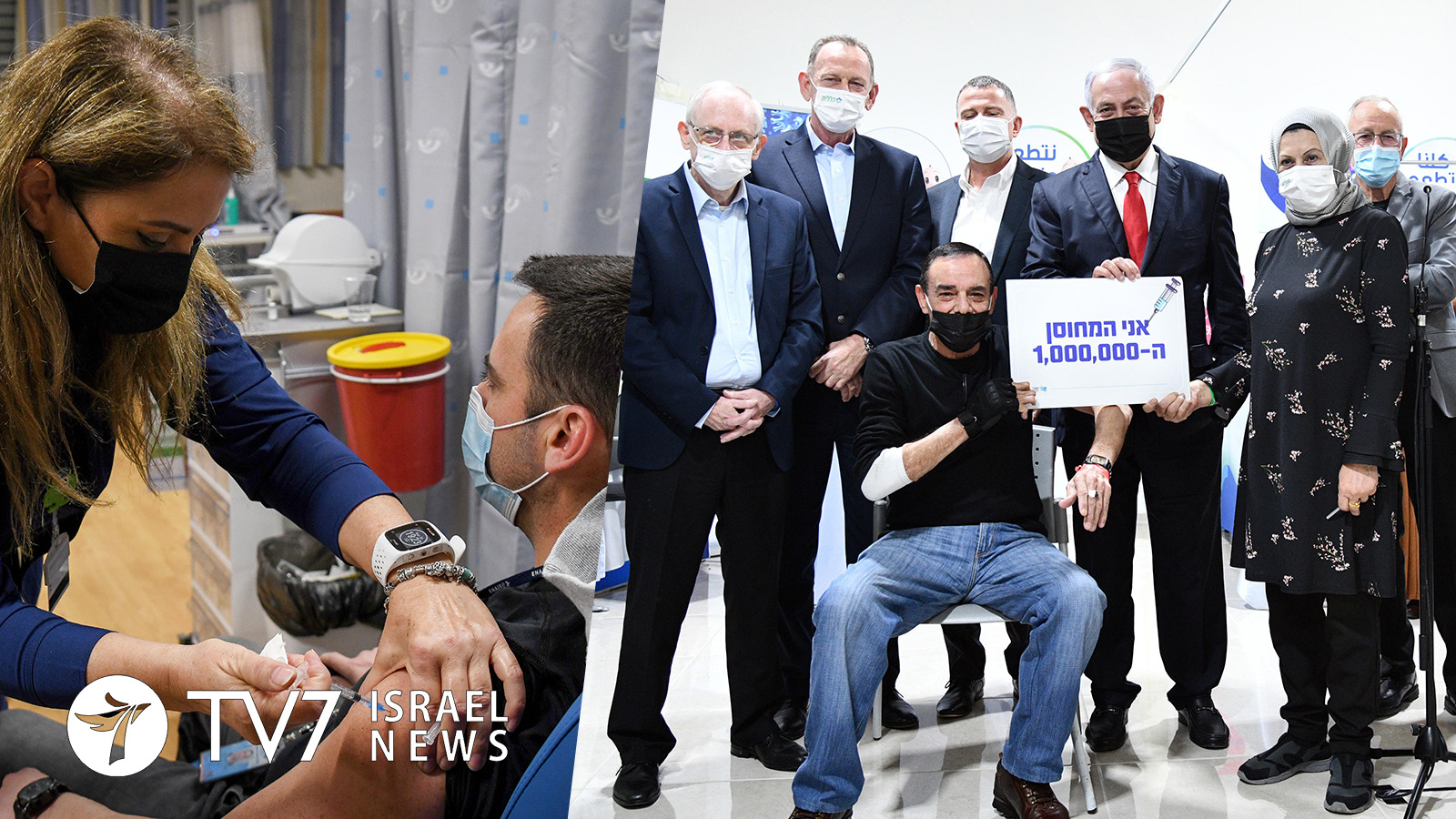Israel is leading the world in the administration of coronavirus vaccinations per capita.
As of yesterday morning, the Ministry of Health announced that at least 1,090,000 people in the country of 9 million were already administered the first of the two-dose Pfizer/BioNTech vaccination as of yesterday morning, with more than 150,000 others being immunized each day.
According to the University of Oxford-based online research publication Our World In Data, by 1 January the total number of vaccination doses administered per 100 people in Israel was 11.55. Comparatively, that is 44 times higher than the rate in Canada, which was 0.26. It was 0.84 in the United States and 1.47 in the United Kingdom.
Israel is also tied for third nation worldwide in total number of doses (1 million), behind China (4.5 million) and the U.S. (2.79 million).
Many countries now seek to emulate Israel’s success. At the request of the office of Austrian Chancellor Sebastian Kurz, a conference call was held last week between the Chancellor’s office and the Austrian Ministry of Health with personnel from the Israeli National Security Council and Ministry of Health. The Health Ministry officials presented the Israeli model for carrying out the complex vaccines operation and answered questions from the Austrian side.
“I think it’s remarkable watching how organized Israel is in terms of getting access to a tremendous amount of vaccines and mobilizing vaccine rollout in a very expedited manner,” said Dr. Isaac Bogoch, an infectious diseases physician and member of the Ontario government’s vaccine distribution task force, as reported by CBC News, adding “And they should be commended for it.”
The impressive rate at which Israel is immunizing its citizens was accomplished in a drive that began just 2 weeks ago. The program’s success is being attributed to the relatively small size of the nation, in which much of the population is rather centralized. Israelis also enjoy affordable universal care administered by Health Maintenance Organizations (HMOs), which were established to cope with largescale events such as the vaccination campaign while able to swiftly and prioritize their most at-risk members.
Prime Minister Benjamin Netanyahu and Health Minister Yuli Edelstein traveled to the northern Arab city of Umm el Fahm to congratulate the 1,000,000th person in Israel to be vaccinated, 66-year-old Muhammad ‘Abd al-Wahhab Jabarin.
“We are ahead of the entire world and now we are ahead of them with our excellent HMOs,” stated Prime Minister Netanyahu, adding, “We are moving forward at great speed in order to vaccinate the entire population.” He then said, “It is important to me also that the Arab population in the State of Israel be vaccinated quickly. It is important because this saves lives and only thus will we be able to return to normal lives.”
“As soon as we reach a critical mass of people who are vaccinated, we will be able to open commerce, the stores and the restaurants,” said Netanyahu, explaining, “We will be able to fly abroad, to make deals and travel in all the countries that we have made peace with, peace that has opened the world and is also changing our history, as Israeli society and as a country.”
Health Minister Edelstein said, “Now, after the 1,000,000th person to be vaccinated is here with us, it is possible to say with certainty that Israel, with G-d’s help, will be the first country in the world to be vaccinated. This is a great achievement. Within a few months, we will be able to say: ‘Hasta la vista’ to the coronavirus and return to normality.”
Edelstein also stressed, “We are all in this together. There is no difference between Jews and Arabs, religious and secular. As long as we are unsuccessful in reaching great numbers of vaccinated people in every place, we will be unable to go out to all of the places that are so important to us all.”
Both leaders strongly appealed for the public to continue strict adherence to Health Ministry directives amid the third nationwide lockdown, which remains in effect.
Current restrictions, initially slated to be enacted for 2 weeks ending on Saturday, 9 January 2021, limit travel from one’s place of residence beyond 1,000 meters. Exceptions are made for the receiving of vaccinations, medical treatment or social work care; attendance of demonstrations or legal proceedings; individual exercise (without use of a vehicle), transfer of minor children between separated parents; travel to a permitted place of work or authorized educational activity; funerals, weddings and circumcisions subject to the restrictions on gatherings.
All public and commercial places have been closed other than those providing “essential services,” including food, optical, pharmaceutical, electric, home repair and hygiene products. All zoos, safari parks, nature reserves, national parks, national and commemorative sites remain shuttered, as are beauty salons, theaters, malls, markets and museums. Restaurants are only permitted to deliver food.
There are no classes for grades 5-10, although there have been no disruptions to the academic schedules of ages 0-6, grades 1-4 and grades 11-12.
The fine for violations is ₪ 500 Shekels ($156.02).
COVID-19 continues to surge in Israel, however, when the Coronavirus Cabinet convenes tomorrow. The Health Ministry reported this morning that 5,135 new cases have been diagnosed in the past 24 hours at a 6.6% infection rate. So far, 69 Israelis have died of coronavirus-related complications since the start of 2021, bringing the overall death toll to 3,416.
Somewhat ironically, Israel ranks 3rd in the world for the number of infections per capita.
Prime Minister Netanyahu is reportedly in favor of enhancing limitations for at least another 10 days. He had previously announced his hope during a televised address for an emergence from the pandemic by March – when the nation is set to return to the polls.
The Israeli leader is running in a March 23 election called after his governing coalition collapsed in December.
— By Erin Viner
